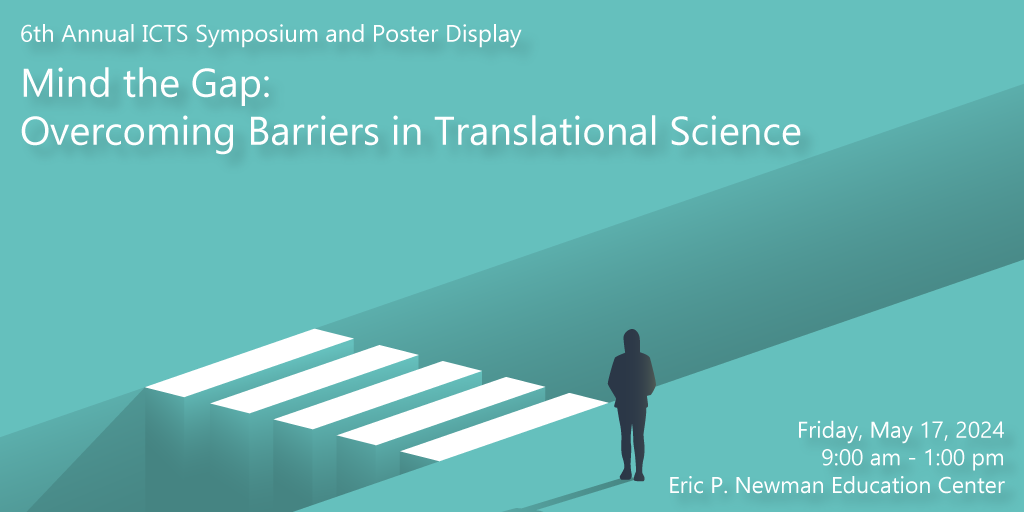
Please join us for the 6th annual symposium hosted by the Institute of Clinical and Translational Sciences.
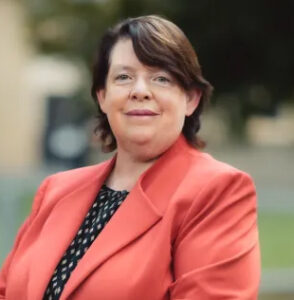
O’Hara
Keynote Speaker
Dr. Ruth O’Hara is, unfortunately, unable to provide the keynote address. We hope to reschedule her presentation for a future date and will contact symposium registrants with this information when available.
| 8:30 am | Attendee check-in |
| 9:00–9:30 am | Welcome by ICTS Director William Powderly, MD
ICTS Update and Future Directions Dr. Powderly will highlight ICTS achievements and discuss future initiatives as the ICTS embarks upon its 17th year of consecutive funding from the National Center for Advancing Translational Sciences. Winners of the poster competition will be announced. |
| 9:30-10:15 am | Research Panel: Addressing the Gap between Early-phase Research and Clinical Trials
Panelists:
Moderated by Christina Gurnett, MD, PhD |
| 10:15–11:45 am | Addressing the Gap Between Clinical Trials and Implementation into Clinical Practice and Population Health
Presenters will each address a facet of research in the T3/T4 stage of translational science and then convene for a panel immediately following at 11:00 am. Presenters/Panelists:
Moderated by William Powderly, MD |
| 11:45 – 12:30 pm | Boxed lunches available. Poster award recipients available with their posters in lobby. |
Research Panelists
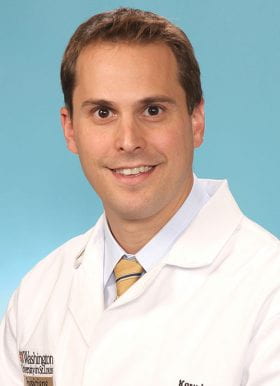
Kory Lavine, MD, PhD
Professor, Medicine, Cardiovascular Division
Professor, Developmental Biology, Pathology, and Immunology
Director, Center for Cardiovascular Research
Washington University School of Medicine
Lavine is the Alan and Edith Wolff Professor in Cardiology, Director of the Center for Cardiovascular Research at Washington University School of Medicine, and a practicing, board-certified cardiologist with expertise in advanced heart failure and cardiac transplantation. He is also the principal investigator of a basic and translational science laboratory focused on understanding the importance and therapeutic implications of immune cell diversity in cardiovascular diseases. Lavine received his bachelor’s degree in biological sciences at the University of Rochester and completed his medical and scientific training at WashU, including a fellowship in advanced heart failure and transplant. He has been the recipient of numerous awards and is an elected member of the American Society of Clinical Investigation.
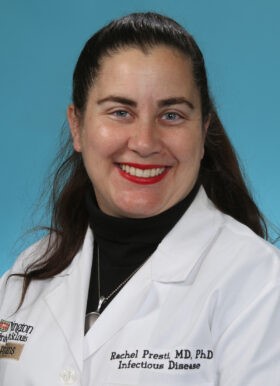
Rachel Presti, MD, PhD, FIDSA
Professor, Medicine, Infectious Disease
Virology Section Head
Director, Infectious Disease Clinical Research Unit
Washington University School of Medicine
Presti is a Professor of Medicine and Section Head for Virology in the Division of Infectious Disease at Washington University. Her research interests center around the pathogenesis of infectious diseases, with a particular emphasis on the immunologic response and pathogenesis of viral infections, particularly HIV and other emerging viruses. Since 2006, she has conducted clinical trials at the Washington University Infectious Disease Clinical Research Unit, where she is medical director and PI of the AIDS Clinical Trials Group (ACTG). She has conducted groundbreaking research in HIV through ACTG and independently funded trials. Dr. Presti responded aggressively to the COVID-19 pandemic, conducting translational research to understand immune responses after infection or vaccination as well as treatment, prevention, and vaccination trials for SARS-CoV-2.

Christina Stallings, PhD
Professor, Department of Molecular Microbiology
Center for Women’s Infectious Disease Research (cWIDR)
Co-Director, Molecular Microbiology and Microbial Pathogenesis Graduate Program
Washington University School of Medicine
Stallings is a Professor in the Department of Molecular Microbiology and the Center for Women’s Infectious Disease Research. She serves as the Co-Director of the Molecular Microbiology and Microbial Pathogenesis Graduate Program at Washington University and is a Co-Founder of the Philip and Sima Needleman Center for Autophagy Therapeutics and Research. She started her faculty position at Washington University School of Medicine in 2010 and research in her laboratory seeks to dissect the molecular mechanisms involved in Mycobacterium tuberculosis pathogenesis while also translating her basic science findings to the development of new therapeutics to treat bacterial infections.
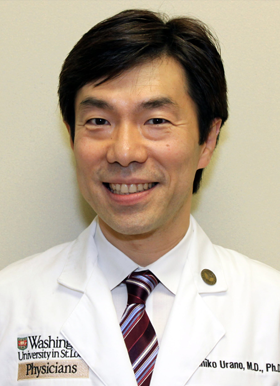
Fumihiko Urano, MD, PhD
Professor of Medicine, Pathology, and Immunology
Division of Endocrinology, Metabolism & Lipid Research
Director, Wolfram Syndrome International Registry & Clinical Study
Washington University School of Medicine
Urano is a physician and medical researcher specializing in Wolfram syndrome, characterized by juvenile-onset diabetes, vision loss, hearing loss, and neurodegeneration. He is a Professor of Medicine and Pathology & Immunology, an attending physician at the Endocrinology Genetics Clinic, and currently holds a Samuel E. Schechter Endowed Professorship in Medicine at Washington University in St. Louis. As the Director of the Wolfram Syndrome and Related Disorders Clinic and Study at Washington University Medical Center, he is a driving force and has been leading the basic science, clinical, translational, and interventional studies of Wolfram syndrome and related disorders. Urano’s collaboration with colleagues at the medical center and around the world has allowed him to develop innovative treatments for this disease, including gene therapy and regenerative therapy.
Presenters

Brett Maricque, PhD
Assistant Professor of Genetics
Co-Director, Center for Community Health Partnership & Research
Washington University School of Medicine
Maricque is an Assistant Professor of Genetics at Washington University School of Medicine (WUSM) and a faculty member at the McDonnell Genome Institute, where he leads the Black Genome Project. He also co-directs the Center for Community Health Partnership & Research and works on healthcare access and delivery using human-centered design. Prior to joining the WUSM faculty, he was the Coordinating Manager of Young Adult Services at NYC Health + Hospital Correctional Health Services, where he coordinated mental and physical health services and delivered project-based education programs to adolescents and young adults who were incarcerated in New York City’s jails. Maricque teaches genomics and data science in WashU’s prison education program.
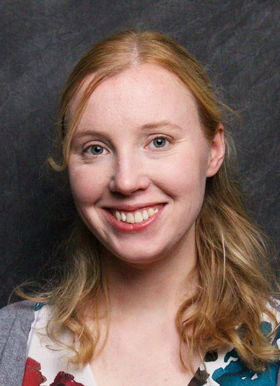
Laura Marks, MD, PhD
Assistant Professor of Medicine, Division of Infectious Diseases
Washington University School of Medicine
Marks is an Assistant Professor in the Division of Infectious Disease at Washington University in St. Louis, MO, where she also serves as the medical director of the Bridge to Health Program, which is an interdisciplinary clinic that provides care for patients with infectious complications of substance use disorders. Her research focuses on S. aureus infections in people who inject drugs, and her group uses a combination of clinical epidemiology, translational, and laboratory approaches. She attends on the general infectious diseases consult service, teaching fellows, residents, and students.

Nandini Raghuraman, MD, MSCI
Assistant Professor, Division of Maternal-Fetal Medicine
Chief of the Division of Clinical Research, Department of Obstetrics and Gynecology
Maternal-Fetal Medicine Fellowship Program Director
Washington University School of Medicine
Raghuraman is a board-certified Maternal-Fetal Medicine specialist and physician-scientist in the Department of Obstetrics and Gynecology. She has research expertise in obstetric randomized trials, labor and delivery interventions, and implementation of evidence-based labor management. She has several ongoing NIH and foundation-funded prospective studies and randomized trials investigating intrapartum interventions and response to fetal monitoring to optimize maternal and neonatal morbidity at the time of delivery. She is also the site PI for multicenter randomized trials investigating interventions for high-risk conditions in pregnancy, such as anemia and hypertension. She has authored over 90 manuscripts related to clinical obstetrics and high-risk pregnancy management and serves as an Associate Editor for the American Journal of Obstetrics and Gynecology.
Moderators
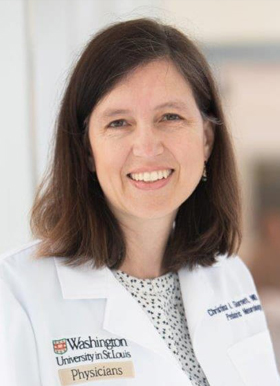
Christina Gurnett, MD, PhD
A. Ernest and Jane G Stein Professor of Neurology
Head, Division of Pediatric and Developmental Neurology
Chief of Neurology, St Louis Children’s Hospital
Co-Director, Intellectual and Developmental Disabilities Research Center
Associate Director, Institute of Clinical and Translational Sciences
Washington University School of Medicine
Gurnett is the A. Ernest and Jane G Stein Professor of Neurology and Head of the Division of Pediatric and Developmental Neurology at Washington University in St Louis, and the Chief of Neurology at St Louis Children’s Hospital. She has an active neurogenetics research program focused on gene discovery for pediatric musculoskeletal disorders, which has resulted in identifying new genes for clubfoot, arthrogryposis, and scoliosis. She also co-directs the Precision Medicine Pathway for graduate students and is strongly committed to training a diverse workforce in her clinical division and research laboratory. During the COVID-19 pandemic, Gurnett has facilitated the distribution of biospecimens to researchers from patients with SARS-CoV-2, which supported Washington University’s development of the saliva-based test for SARS-CoV-2 at GTAC@MGI.
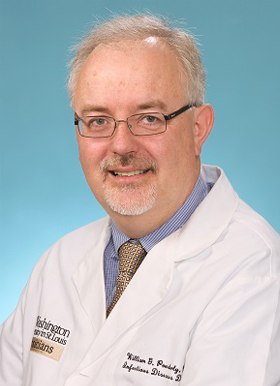
William Powderly, MD
J. William Campbell Professor of Medicine
Associate Dean for Clinical and Translational Sciences
Director, Institute of Clinical and Translational Sciences
Larry J. Shapiro Director, Institute for Public Health
Co-Director of the Division of Infectious Diseases
Washington University School of Medicine
Powderly is the Dr. J. William Campbell Professor of Medicine and co-Director of the Division of Infectious Diseases. He is also the Larry J Shapiro Director of the Institute for Public Health, Associate Dean for Clinical and Translational Science, and Director of the Institute of Clinical and Translational Sciences at Washington University. Powderly has been actively involved in HIV-related clinical research for over thirty years with specific interests in opportunistic infections, metabolic complications, and long-term outcomes of antiretroviral therapy. His major recent focus is translating scientific advances to a wider population to improve public health. He attends on the ID consult service teaching fellows, residents, and students. He is the author of over 400 original manuscripts, reviews, and book chapters.
Visit this page for up-to-date details on the agenda, speakers, and posters.


